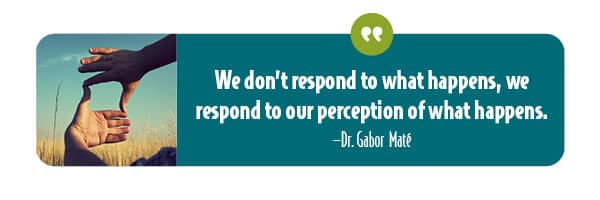If you're struggling to control your anger, you're not alone. It's one of the most common emotions that people struggle with. Its intensity makes it a challenging emotion, especially if you let it build. However, there is an emotional intelligence (EQ) skill that can transform the way you relate to your anger, thereby also facilitating more relational and inner peace.
Estimated reading time: 6 minutes
Seem too good to be true?! Science backs this EQ skill, so rest assured you can build your emotional fitness! Harnessing your anger will take effort, focused attention, and practice, but you can convert your anger into authentic power.
Anger Definition: Let's Get on the Same Page
First, let’s get clear about anger—it often gets a bad rap because many people wait too long to pay attention to what it is trying to communicate, and anger does not like to be ignored!
Anger is, at its most basic definition, simply energy, an urge to take active steps toward a goal or specific outcome. The energy of anger is there to spur us to take action! The goal can be to preserve safety, get your best time in a marathon race, or obtain a promotion at work.
The more important the goal or our appraisal of its value,
the more anger will be triggered in reaction to situations or people who are perceived to be interfering with our goal.
When our safety or a goal is hindered, the first emotion on the scene is usually frustration, which is mild anger. If we take action in response to frustration, it doesn’t need to get stronger. If we brush it aside or push it down, it grows more intense.
Deep Dive: "Anger Is a Vital Energy! Learn to Regulate and Express this Intense Emotion Effectively."
Therefore, your goal is not to repress or stuff your anger but to name it, embrace it, decode its message, and take effective action to be your best self. This process (or emotional intelligence skill) is called emotional regulation, which then leads to self-regulation.
When we’re talking about emotional regulation, it is the ability to assess and identify emotions, as well as calm your emotions when upset. If we view regulation through our behavior, regulating ourselves would be to act according to our values and what is in our long-term best interest. You're in control of your actions, aware of what is important to you rather than being controlled by your emotions. This is self-regulation.
 However, you likely never learned to regulate your emotions if you experienced trauma as a child or your parents were unable to model their own use of regulation when emotionally upset. Insecure attachment and unsafe, unpredictable, or threatening situations while growing up keep our brains in hypervigilance. The brain’s number one priority is safety, and you may still perceive your environment as threatening based on old information and incomplete conclusions of a scared child. We don’t have choices as a child; as adults, we do.
However, you likely never learned to regulate your emotions if you experienced trauma as a child or your parents were unable to model their own use of regulation when emotionally upset. Insecure attachment and unsafe, unpredictable, or threatening situations while growing up keep our brains in hypervigilance. The brain’s number one priority is safety, and you may still perceive your environment as threatening based on old information and incomplete conclusions of a scared child. We don’t have choices as a child; as adults, we do.
The Window of Tolerance
Based on our prior experiences, we all have a Window of Tolerance, coined by Dr. Daniel Siegel. Some have a greater tolerance than others. Our window may be narrower if we’re still recovering from and integrating a trauma. Pay close attention to your cues to catch yourself before arousal becomes an erupting volcano.

Common Symptoms of Dysregulation
Here are common internal cues that we are dysregulated:
- Intense emotions are disproportionate to the situation.
- We shut down or disconnect from an experience.
- Emotions overwhelm us, and we have a hard time thinking logically.
- We have difficulty calming ourselves.
- Our attention frequently gravitates to the negative.
- Negative feelings or outbursts dominate our daily life.
- Our defensiveness engages too quickly or too often.
When we can regulate our emotions, our logical brain is not hijacked by irrational reactions; we don't get taken over by them. Emotional regulation allows us to be in the driver's seat of our feelings—and our lives. We can choose HOW to respond to a situation instead of reacting emotionally. It is a critical emotional intelligence skill that allows you to manage your responses effectively, stay calm under pressure, and make logical decisions with equanimity.
When anger does come up, people with healthy self-regulation are less likely to explode in an angry fit. Emotionally healthy people pay attention and manage their anger in a constructive way that leads to positive results.
Ways to Practice Emotional Regulation
So how do you develop emotional regulation when you have anger issues? Here are six simple anger management tips and ways to begin learning and building the muscle of self-regulation when emotionally activated. Pick one or two and practice them until they become automatic.
 Get in touch with your body.
Get in touch with your body.
When you're feeling angry, take a moment to focus on your physical sensations. Notice where you feel the anger in your body and try to breathe into that area releasing the stress and angst. Studies show that the body/mind connection allows us to tap into emotions through the body. The more you anchor yourself mindfully in your body’s sensations, the less you can act out your anger or continue feeding your anger with unhelpful thoughts.
Another strategy is to deliberately engage your senses. Sometimes smelling essential oils, such as lavender, or stroking a piece of soft fabric like velvet can be soothing.
 Identify and recognize emotional triggers for you.
Identify and recognize emotional triggers for you.
Part of retraining your emotions is acknowledging that specific cues or events set you off.
When I was young, my trigger was feeling overwhelmed with too much to do and helpless due to lacking a particular skill or cognitive know-how to break down big tasks. So how did I repattern the fear and angry reaction?
First, I explored where I felt powerlessness and what kinds of situations triggered me. Second, I learned to talk myself through these situations, encouraging and telling myself that I could handle the situation. And lastly, I learned to self-regulate by:
- Allowing myself permission to feel the emotion.
- Naming the emotion.
- Supporting myself in the situation.
- Problem-solving, then taking action.
- Reaching out for help so I didn’t feel alone.
You can learn to turn your anger into productive action, too!
 How do you discover your triggers? The first step is getting curious. With nonjudgmental curiosity comes awareness and insight that can aid you in the future. It can be helpful to keep a journal of your anger episodes. For each episode, ask yourself the questions below and note the following:
How do you discover your triggers? The first step is getting curious. With nonjudgmental curiosity comes awareness and insight that can aid you in the future. It can be helpful to keep a journal of your anger episodes. For each episode, ask yourself the questions below and note the following:
- What happened immediately before I started feeling angry?
- What was I thinking at the time?
- What emotions did I feel?
- What physical sensations did I experience? Are they familiar?
- What did I do in response to my anger?
After journaling for a while, you'll start to see patterns emerge. These patterns will help you identify your triggers to be more equipped and better prepared to deal with them.
 Practice self-compassion.
Practice self-compassion.
Self-compassion means not judging your emotions but accepting the helplessness and frustration you might be feeling. Be gentle with yourself when you're feeling frustrated or angry. Anger can feel overwhelming because the intense emotion divorces us from our hearts and shoves us into an irrational state.
Tell yourself that anger is natural and reasonable as long as it is not dumped on someone else or targets another person through blame. If you’re upset because you made a mistake at work, remind yourself that everyone makes mistakes.
Give yourself permission to feel rather than throw the “hot potato” outward; cool the hot potato of anger with self-acceptance and soothing activities. When we accept our feelings, even when we don’t feel loveable or adequate, this mindful acceptance dissipates the intensity of negative emotions. Compassionately acknowledge yourself!
 Use positive self-talk.
Use positive self-talk.
Talk to yourself in a supportive and positive way. For example, you might say, “I can handle this,” or “I'm doing my best,” or “I have everything I need to navigate this challenge.”It’s also helpful to consider situations where you were successful and times when things worked out. Capture these successes to remind yourself that you are safe and capable.

 Change the environment by taking a break from the situation.
Change the environment by taking a break from the situation.
If you're feeling overtaken by anger, step back and remove yourself from the situation. Go for a leisurely walk, take some slow, deep breaths, or do something that will help you relax, such as getting a warm cup of tea or drinking a glass of water. This simple change in environment is sometimes enough to calm down.
If you can, go out and enjoy nature; its peacefulness can bring you back to a feeling of inner peace.
 Practice visualization.
Practice visualization.
Picture yourself in a calm and serene place. Perhaps, you see yourself relaxing on a beach in Mexico that you visited recently. Or bring to mind a memory where you felt safe and soothed, such as your spouse holding you in a loving embrace or the natural high you get when you run.
Another way to self-soothe is to visualize yourself handling the situation effectively. Imagine the result you want and see yourself executing actions calmly and assertively.
Remember to be gentle with yourself. When we try a new skill, it takes time and consistency to be successful. Keep at it, and you’ll look back and wonder who you used to be. You won’t recognize that angry self because it will have gradually melted into self-mastery.
To learn how to recognize, modulate, and express your anger effectively, check out our self-guided course.
Improve your emotional intelligence today!











